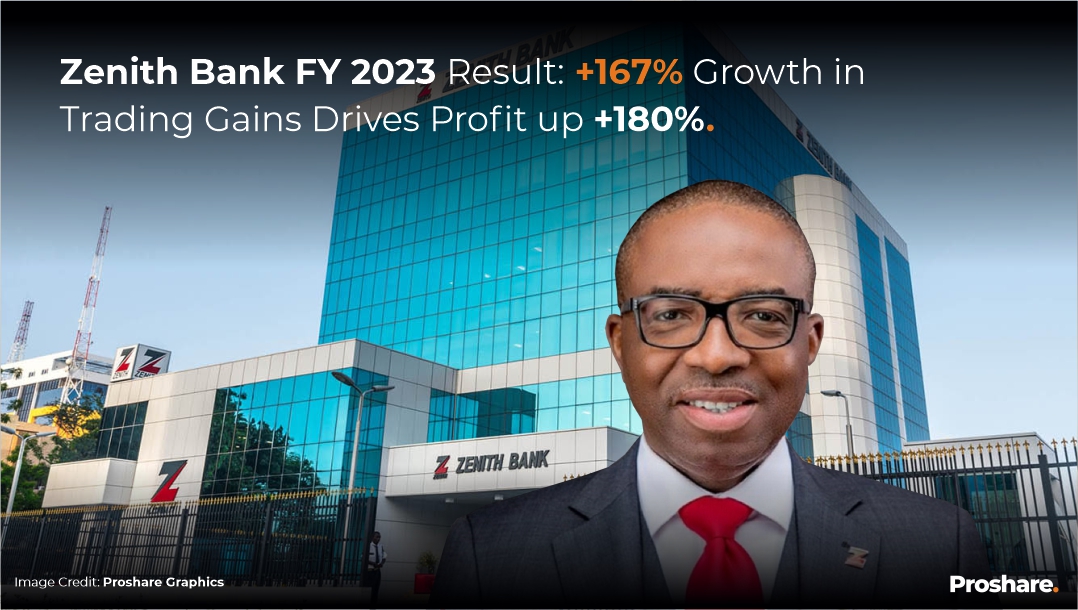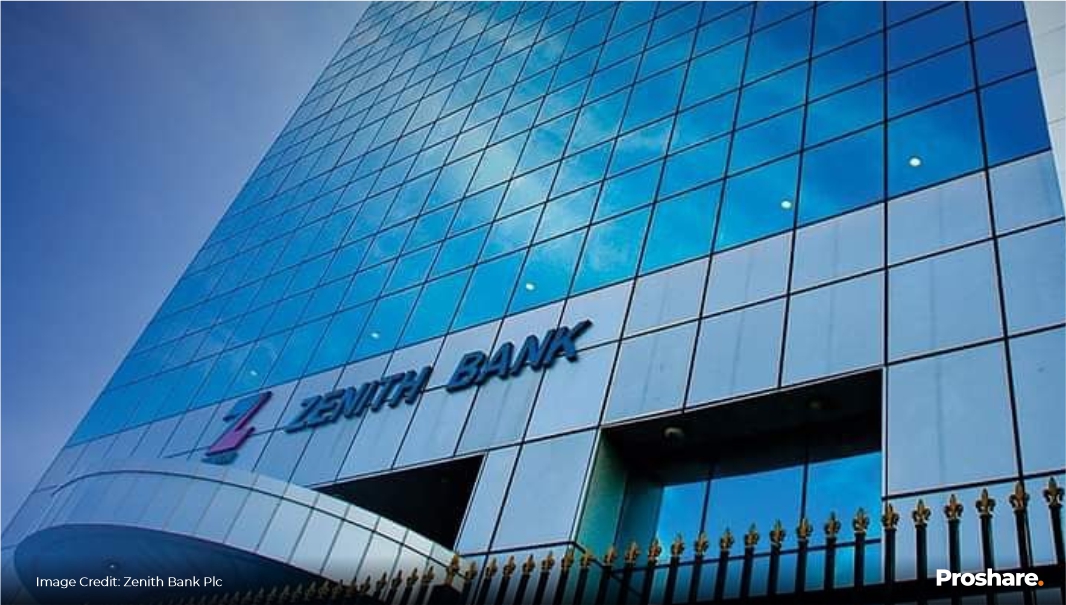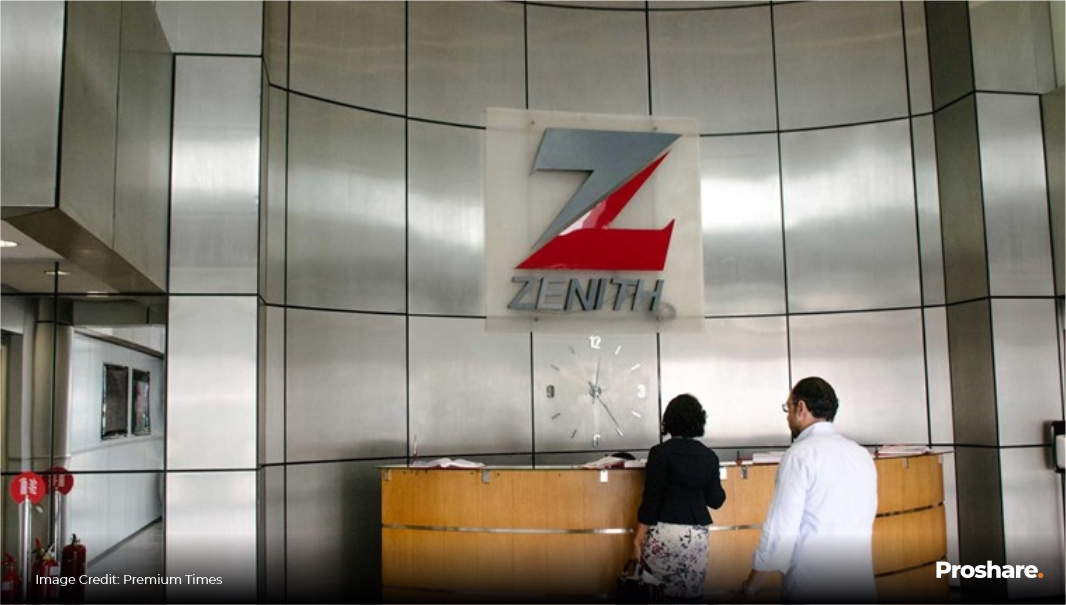The rise in trading gains lifted Zenith Bank Plc’s 2023 profit before tax by 180%. The tier 1 bank saw its performance improve despite macroeconomic headwinds that resulted in rising interest and inflation rates in 2023. Similar to its peers, Zenith Bank was able to needle foreign exchange (FX) gains from its open FX positions. Analysts believe this will not reoccur in 2024 as the Central Bank of Nigeria (CBN) has instructed that local banks keep a zero-forward position, meaning they cannot take advantage of unused FX balances for trading gains.
However, the bank’s underlying performance from its operations was impressive. The financial lender's net interest income rose by 100.80% between FY 2022 and FY 2023. This suggests the bank was to fashion a decent spread in its core lending and deposit-taking activities. Non-interest income grew by 141.19%, indicating a growing earnings ability in non-lending activity as the bank grows its off-balance-sheet transactions, consistent with best global corporate practice for international lenders.
An interesting development is Zenith Bank’s decision to adopt a Holding Company structure similar to other tier 1 lenders in the country. The business model would see Zenith building other non-lending businesses to optimise additional funds through a capital raise programme to commence in 2024. Early calculations indicate that Zenith Bank will need to raise an additional N230bn to meet the requirements for an international operating license under the new CBN capitalization guidelines. Like most banks, the bank has hinted that it would raise funds through a Rights Issue or Private Placement. There is an unlikelihood that the bank would embark on a takeover by merger or acquisition (M&A) (it had the second-highest bank stock price on NGX as of April 24, 2024).
Analysts have noted that despite the social consequence of the poorly implemented naira redesign policy in Q1 2023, banks like Zenith Bank, which temporarily suspended operations in some branches in Lagos, still achieved strong earnings growth and profitability, supporting a tier 1 status likely to be reflected in Proshare’s 2024 Tier 1 Bank Ranking Report but the lenders higher cost of risk (7.30% in FY 2023 from 3.20% in FY 2022) might slightly threaten asset quality classification under the ranking criteria(being the highest among Tier 1 peers). Based on the financial figures, Zenith Bank’s financial ratios improved, with its cost-to-income ratio (CIR) down to 36.10%, return on equity (ROE) to 36.60%, and return on assets (ROA) to 4.10%. However, non-performing loans (NPLs) rose slightly to 4.40% from 4.30% in FY 2022 as bad loans rose to N310.3bn in FY 2023 from N177.3bn in FY 2023.
Analysts observed that the bank’s loan exposure in the oil and gas sector moderated to 30.65% contribution from 44.37%, possibly driven by the deregulation, but the higher exposure from General commerce and Transportation at an allocation of 27.89% and 8.47% was responsible for the mild increase. The sudden rise in non-performing loans reflected the fragile macroeconomic environment, which might likely persist in 2024, given the aggressive rate hikes to curb inflation; thus, Zenith Banks needs to be highly cautious on credit creation.
Zenith Bank’s earnings have grown steadily by an average of 33.82% in the past five years, and its price-to-earnings (P/E) ratio sits at 1.93x compared to the industry average of 7.5x. The price-to-book value (PBV) remains below 1 at 0.56x, further suggesting the stock might be underweight or possess a notable hidden value. Analysts expect investors to remain cautious about banking stocks while awaiting an approved funding strategy to dodge the dilution of share value.
Board of Directors
The appointment of Dr Adaora Umeoji OON as Deputy MD and Dr Juliet Ehiman as non-executive director increased Zenith Bank’s board of directors members to 13 in FY 2023 from 12 in FY 2022 (see table 1 below).
Table 1:
Key Highlights
- Zenith’s gross earnings rose by +125.45% from N945.55bn in FY 2022 to N2.13trn in FY 2023.
- In FY 2023, the group’s interest income rose by +111.91% to N1.14trn, overtaking interest expense which rose by +135.39% to N408.49bn.
- The rising inflationary environment affected the group’s operating costs, as personnel expenses increased by +43.98% to N124.42bn, and other operating expenses grew by +30.84% to N291.73bn.
- Profit before tax soared by +179.63% from N284.65bn in FY 2022 to N795.96bn in FY 2023, and post-tax profit grew by +202.31% to N676.91bn in FY 2023.
- The impairment charge on financial and non-financial assets spiked by +232.34% to N400.65bn in FY 2023 from N123.25bn in FY 2022.
- Zenith Bank’s net fee and commission income dropped to N109.31bn in FY 2023 from N132.80bn in FY 2022, driven by the sudden rise (+179.30%) in fees and commission expenses.
- Total assets grew to +65.79% from N12.26trn in FY 2022 to N20.37trn in FY 2023, driven by significant growth in cash and cash balances, derivative assets, and investment securities.
- Loans and advances to customers rose by +63.35% to N6.56trn in FY 2023 from N4.01trn in FY 2022.
- The group’s customer deposits soared to N15.17trn in FY 2023 from N8.98trn in FY 2022.
- Shareholder’s funds rose by +68.49% to N2.32trn in FY 2023 from N1.38trn in FY 2022.
- Cash and balances with the CBN rose by +93.18% to N4.25trn in FY 2023 from N2.20trn in FY 2022.
- Earnings per share increased to N21.55k in FY 2023 from N7.14k in FY 2022.
Gross Earnings
Zenith Bank’s gross earnings tripled from N945.6bn in FY 2022 to N2.132trn in FY 2023. The growth was from interest and non-interest income, which grew by +111.91% and +141% to N1.14trn and N918.87bn in 2023, respectively. The increase in interest income can be linked to loan growth and risk asset repricing, alongside a rise in the yield of other interest-bearing instruments. Specifically, the interest income has a distribution of 58.7% from loans and advances, 16.4% from government and other bonds, 15.6% from Treasury bills, and 7.1% from placement with banks & discount houses. The non-interest income came from net fees and commission income, trading gains, and other operating income, with an allocation of 11.90%, 61.70%, and 26.40%, respectively (see chart 1 below).
Chart 1:
Profitability
The surge in the bank’s gross earnings positively impacted profitability amidst rising operating expenses, resulting in a +179.63% rise in Profit before Tax from N284.7bn in 2022 to N795.96bn in 2023. Profit After Tax (PAT) grew by +202.31% from N223.9bn in FY 2022 to N676.9bn in FY 2023. The group incurred N291.79bn as operating expenses and N124.42bn as personnel expenses, +42.33% and +30.84% higher than the previous year. Despite the technical glitches experienced in Q1 2023 that slowed down digital banking usage, the group earned N51.82bn in FY 2023, +13.29% higher than FY 2022 (see chart 2 below).
Chart 2:
Financial Position
The group’s total assets increased by +65.79% to N20,368.46trn in FY 2023 from N12.3trn in 2022. The asset growth came from cash and balances with Central Bank (+93.18% Y-o-Y), derivative assets (+972.18%, Y-o-Y), other assets (+122.45%, Y-o-Y), and intangible assets (+86.20%, Y-o-Y). The group’s investment securities and treasury bill holdings have risen from N3.97trn in FY 2022 to N6.02trn in FY 2023, showing a diversion into investment as loan creation slows due to the high-risk economic environment. Similarly, the derivative assets rose to N534.73bn in FY 2023 from N49.87bn in FY 2022.
The group has continued to deepen its retail penetration as customer deposits increased by +68.99% from N8.97trn to N15.16trn in 2023. The group’s customer deposits have a distribution of 45% as demand deposits, 33% as savings deposits and 21% as term deposits. With the group’s retention rate of 78%, the retained earnings benefited from the robust profit, rising by +88.70% to N1.18trn, supporting shareholder funds to N2.32trn in FY 2023 from N1.37trn in FY 2022 (see table 2 below).
Table 2:
Financial Ratios
Zenith Bank’s vital financial ratios improved in FY 2023. Underpinned by improved gross earnings and profitability, Zenith Bank’s return on equity (ROE) and Average Assets (ROAA) rose to 36.60% and 4.10% in FY 2023. The net interest margin remained at 7.30% in FY 2023 as the group incurred higher interest expenses. The bank’s cost of funds spiked to 7.3% in FY 2023 from 3.20% in FY 2022 due to the increased risk environment.
In the past five years, Zenith Bank has struggled to achieve the 65% statutory loan-to-deposit ratio (LDR). The LDR fell to 46.50% in FY 2023 against 51.60% in FY 2022, suggesting lower loan creation relative to growing deposits. Zenith Bank’s loan and advances grew by 63.35% to N6.55bn in FY 2023 from N4.01bn in 2022, representing one-third of the customer’s deposit at N15.16bn as of December 2023. Over the years, Zenith Bank has seen its cost-to-income ratio (CIR) hover above 50%, and the CIR slid to 36.1% in FY 2023. Despite modest loan growth, Zenith Bank's non-performing loan ratio inched up to 4.4% in 2023. The lender’s prudential ratios remain within regulatory thresholds, with the Capital Adequacy Ratio (CAR) and liquidity ratio at 21.7% and 71.0%, respectively (see Table 3 below).
Table 3:
Valuation
In FY 2023, Zenith Bank’s Price-to-Earnings (P/E) ratio dropped to 1.93x from 3.36x in FY 2022, reflecting higher market attraction relative to the previous year. Zenith Bank's P/B ratio slightly increased to 0.55x, signifying that investors valued the bank at N0.55 for every N1 book value per share. Despite a slight uptick to 0.56x in FY 2023, the P/B ratio remained below 1, implying continued undervaluation relative to the bank's book value (see table 4 below).
Table 4:
Share Price Movement
Zenith Bank’s share price fluctuated upwardly mostly in 2023. In the first quarter of 2023, the share price started at N24.00k and gradually increased to N25.85k by the end of March before fluctuating several times to a new support price of N21.80k on April 20, 2023, just before recovery by early May 2023. The second quarter saw further increases, with the share price peaking at N34.25k on June 30, 2023. The share price rose steadily to a record high of N37.10k on September 06, 2023, but slumped, sliding back to N31.45k on September 30, 2023. The share price pulled out of the dip in October, settling at N34.90k on December 5, 2023. Despite its share price volatility in Q3 and Q4, the financial lender generated a year-to-date (YTD) return of 61.04%, ahead of the country’s inflation rate of 28.92% as of December 2023. The bank joined the league of companies with a N1trn market capitalization as of June 2023 (see chart 3 below).
Chart 3:
Competitor Analysis
The banking industry players saw gross earnings and profitability climb to a record high, benefitting from MPR hikes and naira devaluation. Among the tier 1 banks, Access Holding had the highest gross earnings at N2.59trn, and GTCO had the lowest at N1.19trn, but Zenith Bank took the lead in terms of profit at N795.96bn, ahead of UBA (N757.68bn) and Access Holding (N729.00bn).
The bank's high earnings made the earnings per share grow to a double-digit, with Zenith Bank taking the lead at N21.55k while Access Holding had the lowest at N17.23bn. This implies that Access Holding incurred high operating costs, eating deep into the profit compared to Zenith Bank. However, Access Holding retained its position as the highest customer depositor at N15.32trn ahead of UBA and Zenith, while GTCO had the lowest at N7.41trn.
Similarly, the banks' financial ratios had a positive outcome, with GTCO having the highest net interest margin, return on equity, and return on assets. Also, GTCO was the most cost-efficient, with the lowest cost-to-income ratio of 29.10%, while Access Holding was the least efficient at 44.69%. The fundamental valuation of the banks showed that GTCO had the highest price-to-book value and price-to-earnings at 0.96x and 2.31x, while Access holding had the least at 0.39x and 1.39x, respectively. This implies that GTCO's market value reflected its underlying book value and earnings more than the remaining banks.
Despite the high-interest rate environment, GTCO had a 1.80% cost of funds, significantly lower than its peers, with Access Holding having the highest at 4.90%. However, Zenith had the highest Cost of risk at 7.30%, while Access Holding had the lowest at 1.00%. GTCO seems to have better financial health than others based on the financial ratios despite having the lowest gross earnings, profit, and asset size (see dashboard 1 below).
Dashboard 1:
Closing Thought
Zenith Bank could navigate the challenging 2023 macroeconomic environment by strategically holding significant foreign currency loans, off-balance sheet assets, and domestic loan asset repricing. However, the Nigerian banking sector's performance in 2024 might be slightly different, shaped around asset quality, risk management, regulatory changes, and digital evolution. The bank will need to be intentional in its risk management as loan default risk remains relatively high with persistent inflation, falling demand, and growing corporate inventories. Analysts expect the bank’s cost of funds at 7.30% in FY 2023 to moderate in FY 2024, given the fund inflow from recapitalisation.
 Lagos, NG • GMT +1
Lagos, NG • GMT +1











 683 views
683 views





























 Sponsored Ad
Sponsored Ad
 Advertise with Us
Advertise with Us









